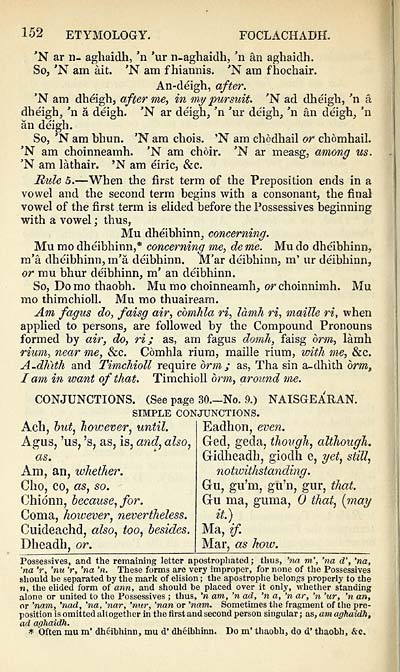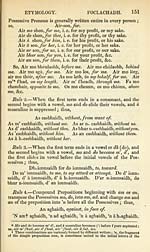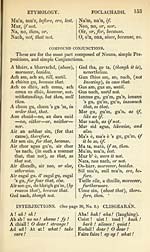Books and other items printed in Gaelic from 1841 to 1870 > Stéidhean a' Ghràmair Ghaëlig
(180) Page 152
Download files
Complete book:
Individual page:
Thumbnail gallery: Grid view | List view

152 ETYMOLOGY.
FOCLACHADH.
'N ar n- aghaidh, 'n 'ur n-aghaidh, 'n àn aghaidh.
So, 'N am àit. 'N am f hiannis. 'N am fhochair.
An-dèigh, after.
'N am dhèigh, after me, in mypursuit. 'N ad dhèigh, 'n à
dhèigh, 'n à dèigh. 'N ar dèigh, 'n 'ur dèigh, 'n àn dèigh, 'n
àn dèigh.
So, 'N am bhun. 'N am chois. 'N am chòdhail or chòmhail.
'N am choinneamh. 'N am chòir. 'N ar measg, among us.
'N am làthair. 'N am èiric, &c.
Rule 5. — When the first term of the Preposition ends in a
vovvel and the second term begins with a consonant, the final
vowel of the fìrst term is elided before the Possessives beginning
with a vowel ; thus,
Mu dhèibhinn_, conceming.
Mu mo dhèibhinn,* concerning me, de me. Mu do dhèibhinn,
m'à dhèibhinn, m'à dèibhinn. M'ar dèibhinn, m' ur dèibhinn,
or mu bhur dèibhinn, m' an dèibhinn.
So, Do mo thaobh. Mumo choinneamh, orchoinnimh. Mu
mo thimchioll. Mu mo thuaiream.
Am fagus do, faisg air, còmhla ri, làmh ri, maille ri, when
applied to persons, are followed by the Compound Pronouns
formed by air, do, ri ; as, am fagus clomh, faisg òrm, làmh
rium, near me, &c. Còmhla rium, maille rium, with me, &c.
A-dJììth and Timchioll require òrm ; as, Tha sin a-dhìth òra,
lam in want oftJiat. Timchioll òrm, around me.
CONJUNCTIONS. (See page 30.— No. 9.) NAISGEARAN.
SIMPLE CONJUNCTIONS.
Ach, but, hoivever, until.
Agus, 'us, 'Sj as, is, and, also,
as.
Am, an, wJiether.
Cho, co, as, so.
Chiònn, because, for.
Coma, however, nevertJieless.
Cuideachd, also, too, besides.
Dheadh, or.
Eadhon, even.
Ged, geda, tJwvgJi, although.
Gidheadh, giodh e, get, stitt,
notwithstanding.
Gu, gu'm, gu'n, gur, that.
Gu ma, guma, ihat, [inay
it.)
Ma, if.
Mar, as how.
Possessives, and the remaining letter apostrophated ; thus, 'na m', 'na d\ 'na,
'na 'r, 'nu 'r, 'na 'n. These forms are very improper, for none of the Possessives
should be separated by the mark of elision ; the apostrophe belongs properly to the
n, the elided form of ann, and should be placed over it only, whether standing
alone or united to the Possessives ; thus, 'n am, 'n ad, 'n a, 'n ar, 'n 'ur, 'n an,
or 'nam, 'nad, 'na, 'nar, 'nur, 'nan or 'nam. Sometimes the fragment of the pre-
position is omitted altogether in the fìrst and second person singular ; as, am aghaidh,
ad aflhaidh.
* Often mu m' dheibhinn, mu d' dheibhinn. Do m' thaobh, do d' thaobh, &c.
FOCLACHADH.
'N ar n- aghaidh, 'n 'ur n-aghaidh, 'n àn aghaidh.
So, 'N am àit. 'N am f hiannis. 'N am fhochair.
An-dèigh, after.
'N am dhèigh, after me, in mypursuit. 'N ad dhèigh, 'n à
dhèigh, 'n à dèigh. 'N ar dèigh, 'n 'ur dèigh, 'n àn dèigh, 'n
àn dèigh.
So, 'N am bhun. 'N am chois. 'N am chòdhail or chòmhail.
'N am choinneamh. 'N am chòir. 'N ar measg, among us.
'N am làthair. 'N am èiric, &c.
Rule 5. — When the first term of the Preposition ends in a
vovvel and the second term begins with a consonant, the final
vowel of the fìrst term is elided before the Possessives beginning
with a vowel ; thus,
Mu dhèibhinn_, conceming.
Mu mo dhèibhinn,* concerning me, de me. Mu do dhèibhinn,
m'à dhèibhinn, m'à dèibhinn. M'ar dèibhinn, m' ur dèibhinn,
or mu bhur dèibhinn, m' an dèibhinn.
So, Do mo thaobh. Mumo choinneamh, orchoinnimh. Mu
mo thimchioll. Mu mo thuaiream.
Am fagus do, faisg air, còmhla ri, làmh ri, maille ri, when
applied to persons, are followed by the Compound Pronouns
formed by air, do, ri ; as, am fagus clomh, faisg òrm, làmh
rium, near me, &c. Còmhla rium, maille rium, with me, &c.
A-dJììth and Timchioll require òrm ; as, Tha sin a-dhìth òra,
lam in want oftJiat. Timchioll òrm, around me.
CONJUNCTIONS. (See page 30.— No. 9.) NAISGEARAN.
SIMPLE CONJUNCTIONS.
Ach, but, hoivever, until.
Agus, 'us, 'Sj as, is, and, also,
as.
Am, an, wJiether.
Cho, co, as, so.
Chiònn, because, for.
Coma, however, nevertJieless.
Cuideachd, also, too, besides.
Dheadh, or.
Eadhon, even.
Ged, geda, tJwvgJi, although.
Gidheadh, giodh e, get, stitt,
notwithstanding.
Gu, gu'm, gu'n, gur, that.
Gu ma, guma, ihat, [inay
it.)
Ma, if.
Mar, as how.
Possessives, and the remaining letter apostrophated ; thus, 'na m', 'na d\ 'na,
'na 'r, 'nu 'r, 'na 'n. These forms are very improper, for none of the Possessives
should be separated by the mark of elision ; the apostrophe belongs properly to the
n, the elided form of ann, and should be placed over it only, whether standing
alone or united to the Possessives ; thus, 'n am, 'n ad, 'n a, 'n ar, 'n 'ur, 'n an,
or 'nam, 'nad, 'na, 'nar, 'nur, 'nan or 'nam. Sometimes the fragment of the pre-
position is omitted altogether in the fìrst and second person singular ; as, am aghaidh,
ad aflhaidh.
* Often mu m' dheibhinn, mu d' dheibhinn. Do m' thaobh, do d' thaobh, &c.
Set display mode to:
![]() Universal Viewer |
Universal Viewer | ![]() Mirador |
Large image | Transcription
Mirador |
Large image | Transcription
Images and transcriptions on this page, including medium image downloads, may be used under the Creative Commons Attribution 4.0 International Licence unless otherwise stated. ![]()
| Rare items in Gaelic > Books and other items printed in Gaelic from 1841 to 1870 > Stéidhean a' Ghràmair Ghaëlig > (180) Page 152 |
|---|
| Permanent URL | https://digital.nls.uk/101713759 |
|---|
| Description | Out-of-copyright books printed in Gaelic between 1631 and 1900. Also some pamphlets and chapbooks. Includes poetry and songs, religious books such as catechisms and hymns, and different editions of the Bible and the Psalms. Also includes the second book ever published in Gaelic in 1631. |
|---|

